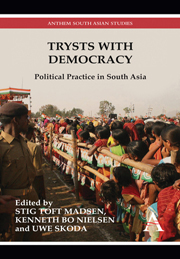Book contents
- Frontmatter
- Contents
- List of Tables
- List of Abbreviations
- Glossary
- Map of South Asia
- Acknowledgements
- 1 Introduction
- Part One Theoretical Issues
- Part Two India
- Part Three Beyond India
- 8 Nepal: Governance and Democracy in a Frail State
- 9 Entanglements of Politics and Education in Sri Lanka
- 10 Shifting between the Local and Transnational: Space, Power and Politics in War-torn Sri Lanka
- 11 Domestic Roots of Indian Foreign Policy
- 12 When Democracy is Not the Only Game in Town: Sectarian Conflicts in Pakistan
- About the Editors
- About the Contributors
9 - Entanglements of Politics and Education in Sri Lanka
from Part Three - Beyond India
Published online by Cambridge University Press: 05 March 2012
- Frontmatter
- Contents
- List of Tables
- List of Abbreviations
- Glossary
- Map of South Asia
- Acknowledgements
- 1 Introduction
- Part One Theoretical Issues
- Part Two India
- Part Three Beyond India
- 8 Nepal: Governance and Democracy in a Frail State
- 9 Entanglements of Politics and Education in Sri Lanka
- 10 Shifting between the Local and Transnational: Space, Power and Politics in War-torn Sri Lanka
- 11 Domestic Roots of Indian Foreign Policy
- 12 When Democracy is Not the Only Game in Town: Sectarian Conflicts in Pakistan
- About the Editors
- About the Contributors
Summary
Introduction: Why Politics and Education?
The ethnographer's research agenda is always susceptible to the interests and priorities of the people she studies. In my own research into developmentand conflict-related displacements, community-building and identity formation in Sri Lanka over the past two decades, education has been one such issue, which has kept reappearing in interesting and unpredictable ways because it is utterly important to people. In 2005 I decided to pursue the matter and explore the conditions, meanings and relevance of education in Muslim, Tamil and Sinhalese schools through ethnographic field research in and around schools. This simultaneously became a window into popular perceptions of the Sri Lankan state, national and local politicians and the state of contemporary politics.
In an introduction to anthropological approaches to democracy, Julia Paley asserts that democracy is most often identified by its most conspicuous features, namely ‘free and fair elections, a multi-party system, and freedoms of expression and the press’, but democracy, she suggests, is far more complex (Paley 2008, 3). Paley consequently urges us to adopt a more open-ended approach to democracy, paying attention to how democracy is perceived, practiced and produced over time by different actors in specific settings (Paley 2008, 19). Paley here follows a general anthropological inclination in the study of politics and the political, which is to critique and challenge theoretical conceptualisations that are based on Western historical experiences, but made to appear universal and generally applicable (Kabeer 2005).
- Type
- Chapter
- Information
- Trysts with DemocracyPolitical Practice in South Asia, pp. 215 - 238Publisher: Anthem PressPrint publication year: 2011
- 3
- Cited by

